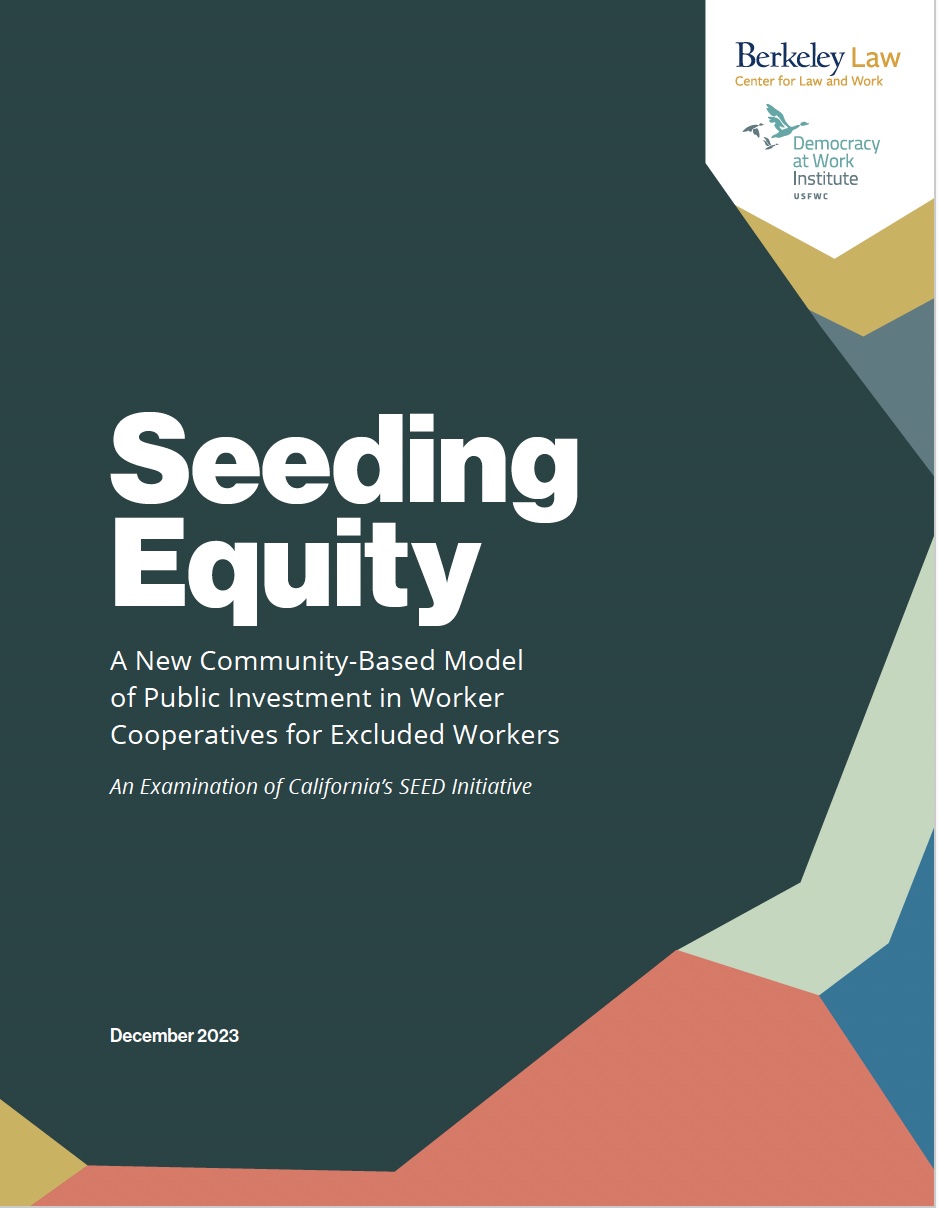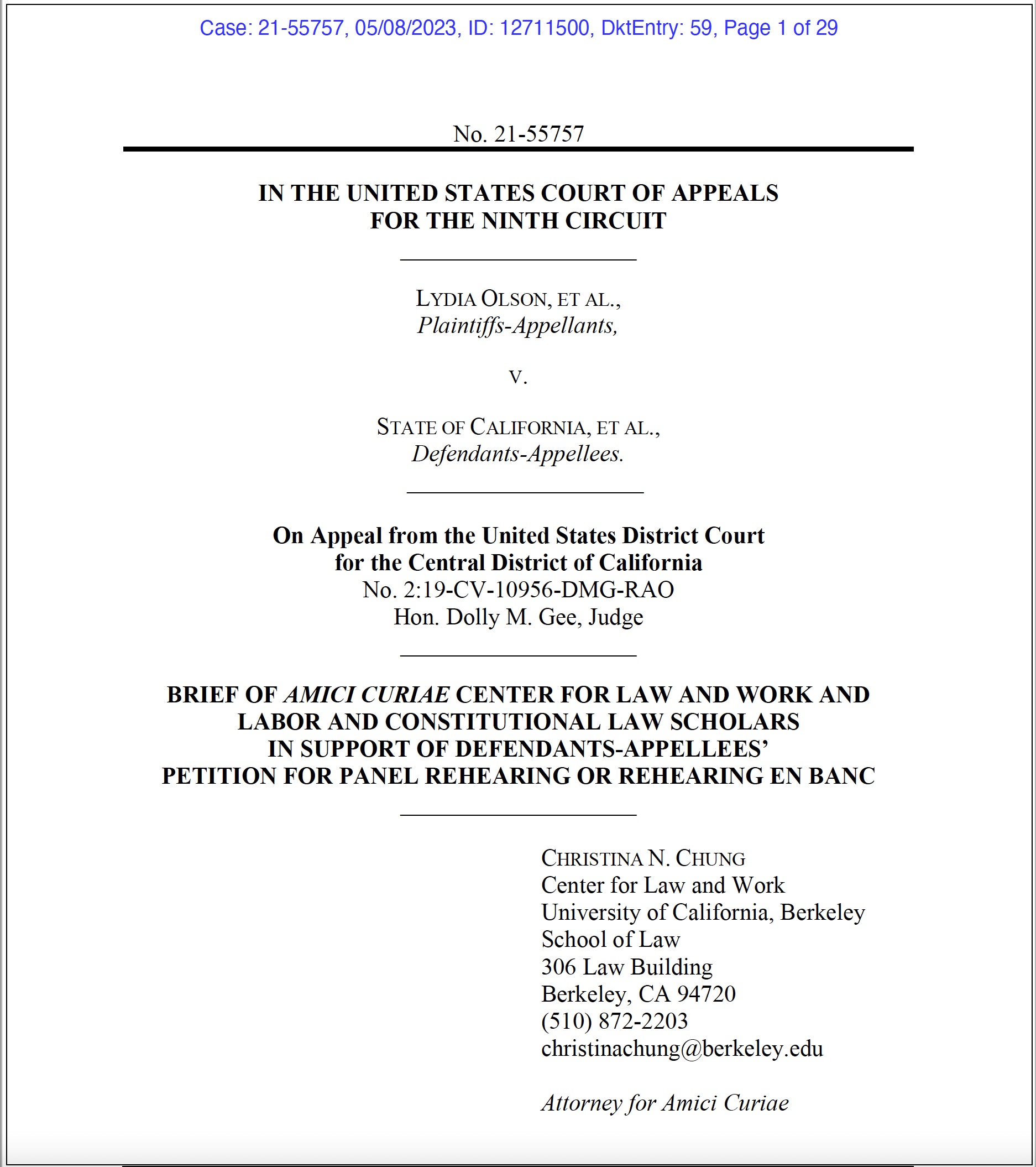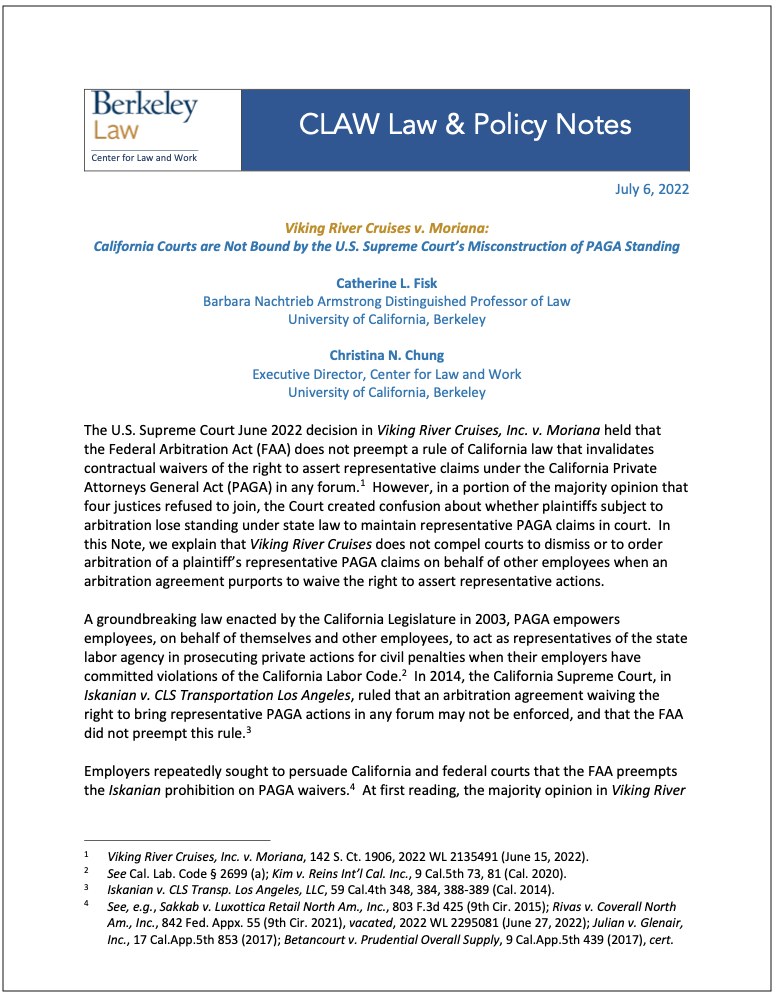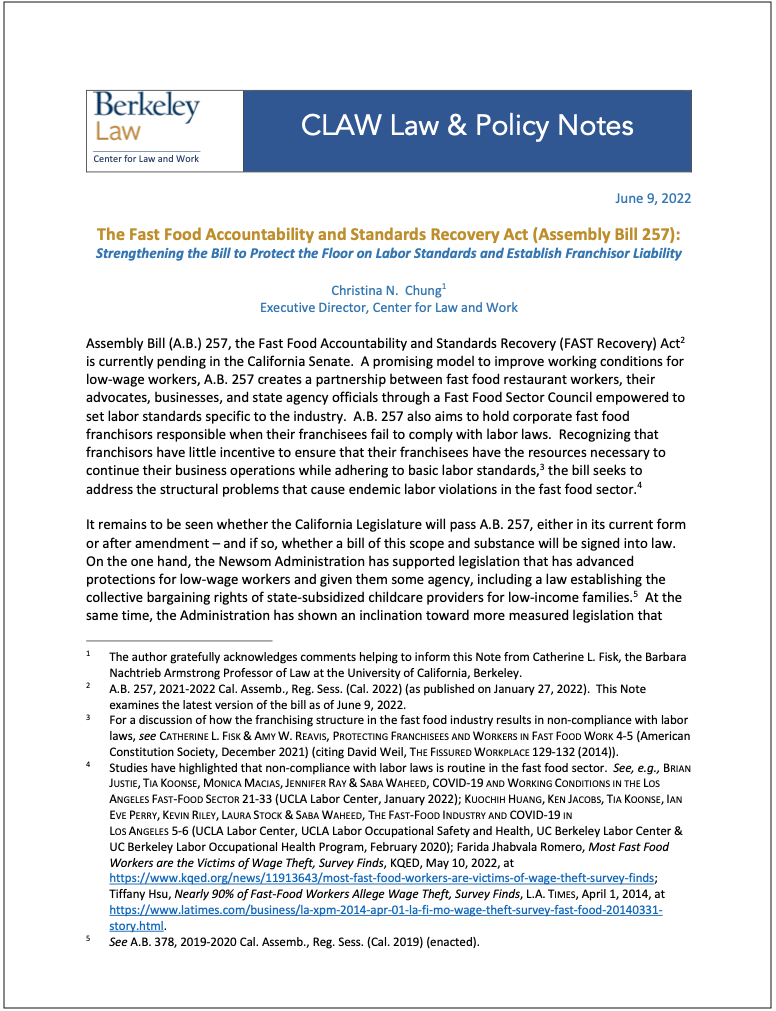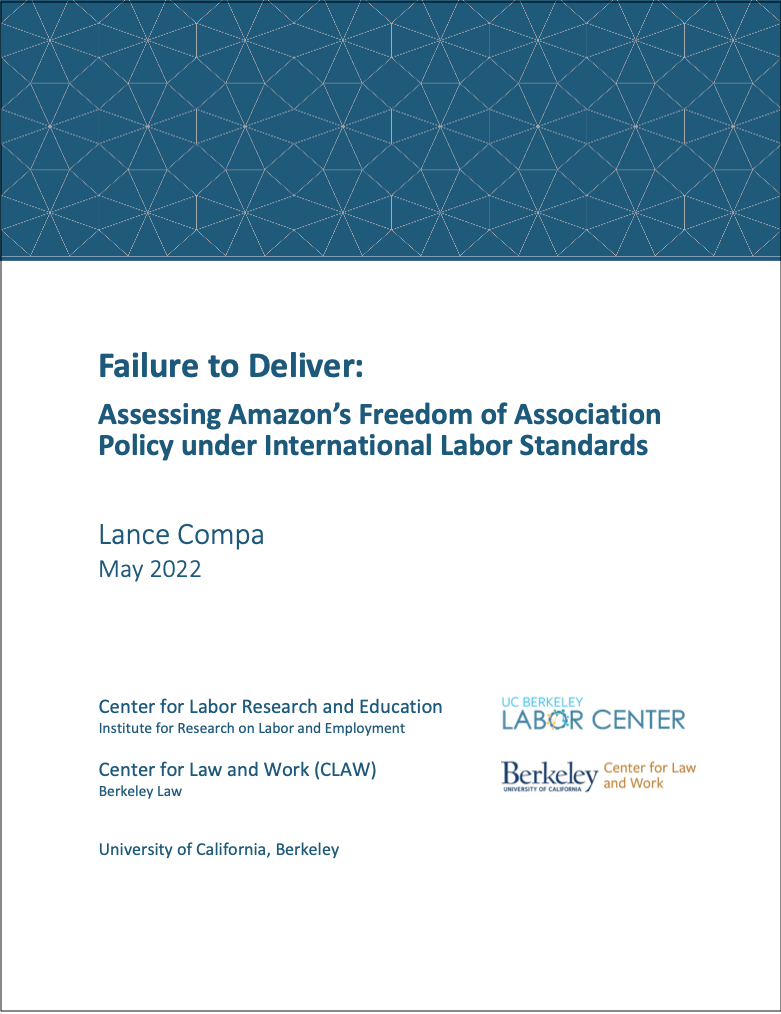Olson v. California: Let the Statute Speak for Itself
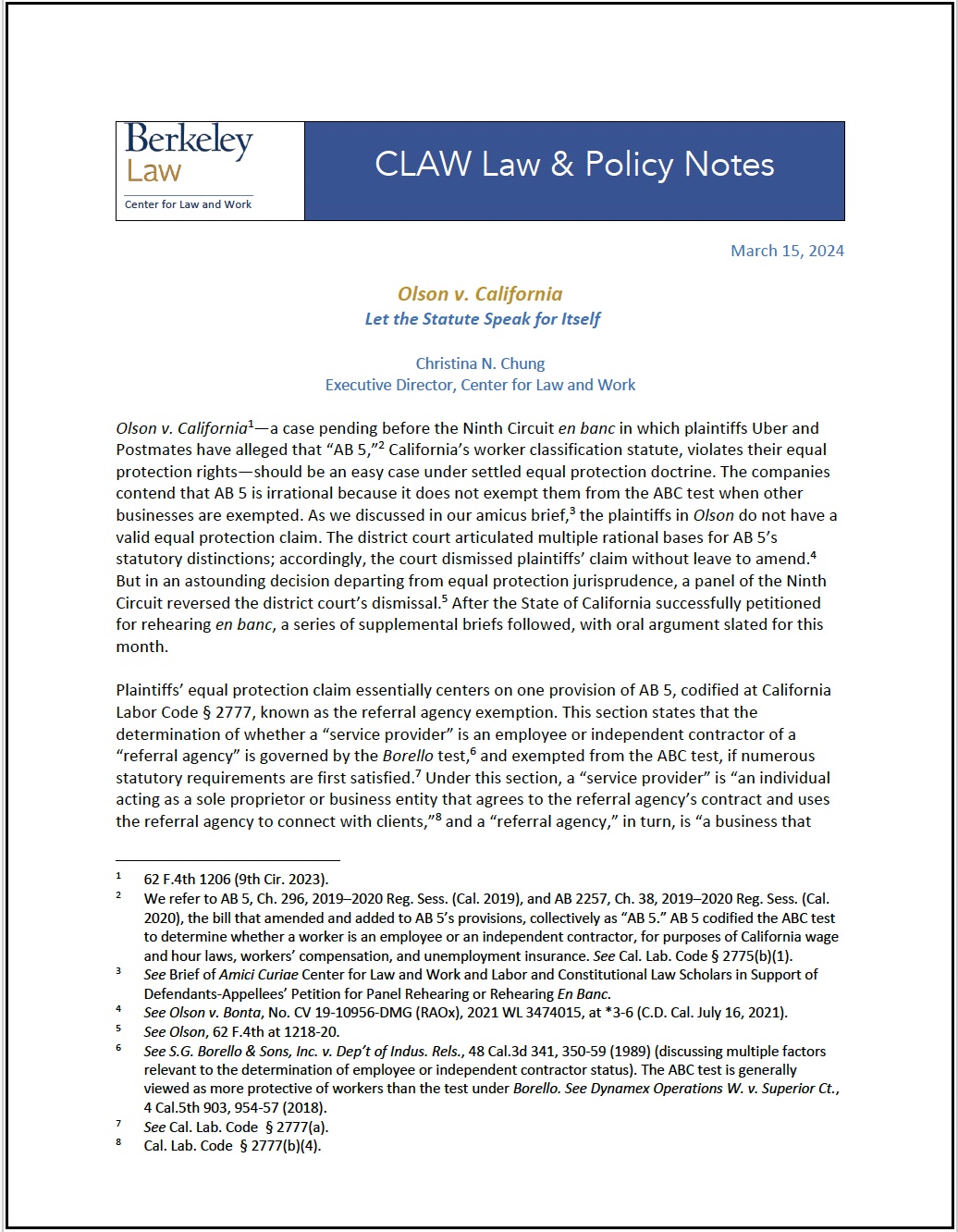 LAW & POLICY NOTE (March 2024)
LAW & POLICY NOTE (March 2024)Olson v. California—a case pending before the Ninth Circuit en banc in which plaintiffs Uber and Postmates have alleged that AB 5, California’s worker classification statute that codifies the ABC test, violates their equal protection rights—should be an easy case to resolve against plaintiffs under settled equal protection doctrine. Plaintiffs’ claim essentially centers on one provision of AB 5, codified at California Labor Code § 2777, known as the "referral agency exemption" from the ABC test. Objecting to this exemption because they are excluded from it, plaintiffs primarily argue they are similarly situated with other app-based gig companies like Wag! and TaskRabbit that can seek the exemption, and that only animus and political favoritism explain treating plaintiffs differently. Although plaintiffs’ claim was dismissed without leave to amend by the district court, a panel of the Ninth Circuit reversed the district court’s dismissal. The State successfully petitioned for rehearing.
In this Note, we point out a key rationale for the distinctions drawn in the referral agency exemption that is clear on the face of the statute but has not received attention: the exemption’s carve-out, which excludes services provided in certain high hazard industries like the ones in which plaintiffs operate, is rationally related to one of AB 5’s legitimate purposes, namely, to protect workers when they are injured on the job from the harm of misclassification. While this rationale has not been briefed by the State, the Ninth Circuit is not bound by the parties’ arguments and should look beyond them to the plain language of the statute. This presents a straightforward path for the en banc Court to affirm dismissal of plaintiffs' equal protection claim, without any need to address the question of whether plaintiffs are similarly situated.
Seeding Equity: A New Community-Based Model of Public Investment in Worker Cooperatives for Excluded Workers
In 2021, California launched Social Entrepreneurs for Economic Development (SEED), an innovative grant program fostering high-road business ownership opportunities for excluded workers (individuals who cannot access stable, gainful employment relationships and whose economic opportunities are severely constrained due to their immigration status or other significant barriers to employment). SEED funded a demonstration project on worker cooperatives, spearheaded by community-based organizations (CBOs) that organize excluded workers in low-wage industries. Through an impressive collaboration between these CBOs (CLEAN Carwash Worker Center, Cooperacion Santa Ana, Pilipino Workers Center of Southern California, and United Taxi Workers of San Diego), and experts in cooperative development (Democracy at Work Institute and L.A. Co-op Lab), SEED propelled the development of worker-owned and led businesses in four historically low-wage, exploitative industries: carwash, child care, homecare, and taxicab.
Significantly, SEED recognized the central role of mission-driven CBOs that mobilize excluded workers, advocate for economic justice, and have deep roots in their local communities—and then equipped the CBOs with the resources, knowledge, and tools they needed to be leaders in cooperative development. Only two years since its formation, the model built through SEED has already taken root as a compelling prototype of public investment in worker cooperatives. In this report, we identify and examine SEED’s key components and highlight some emerging indicators, both quantitative and qualitative, of the model’s considerable potential to transform low-wage work through the creation of worker-owned businesses that center democratic decision-making, higher wages, and good working conditions.
The Importance of the Revival of California’s Industrial Welfare Commission: The Promise and Future of Tripartite Sectoral Negotiated Rulemaking in California and Beyond
LAW &
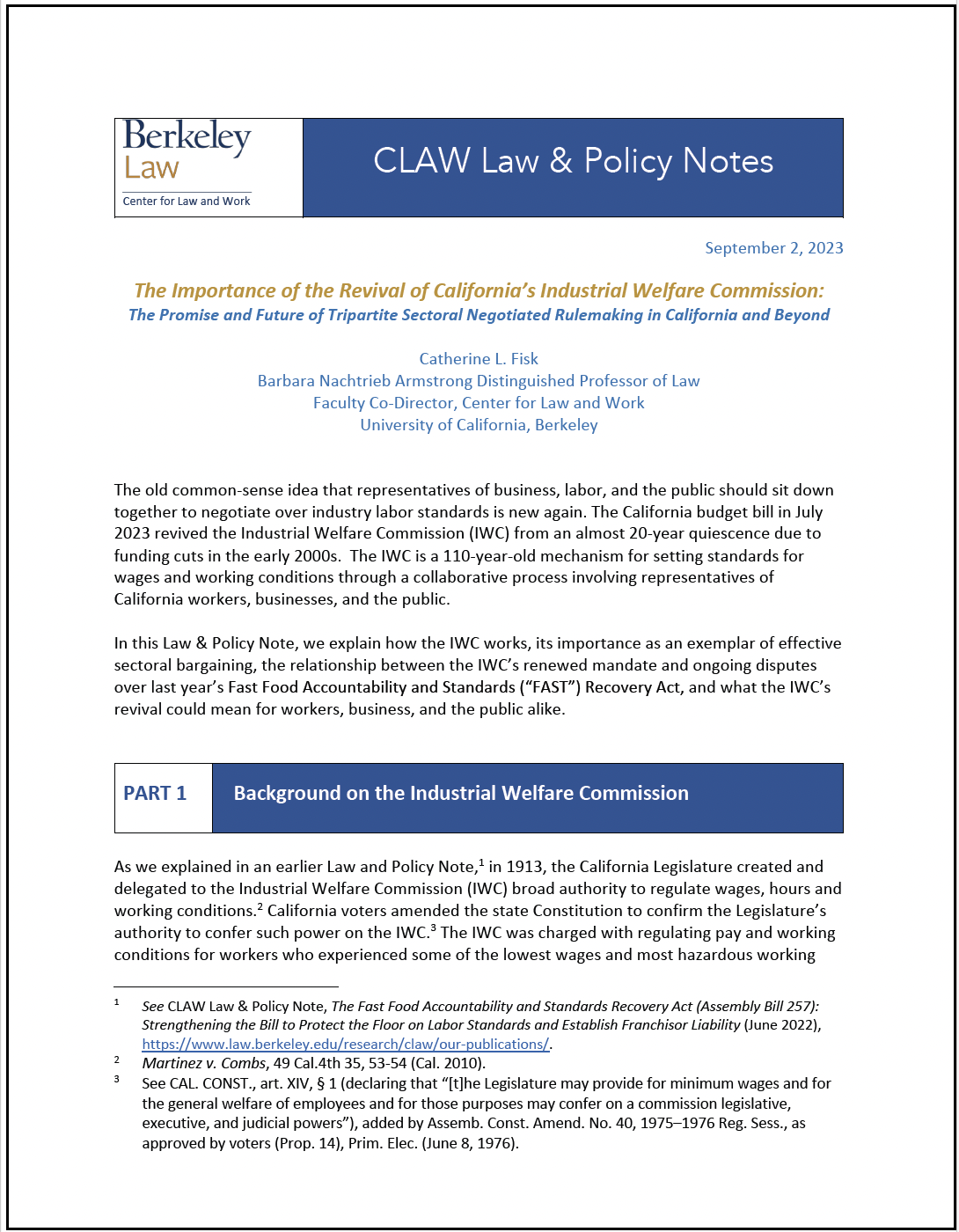 POLICY NOTE (September 2023)
POLICY NOTE (September 2023)The old common-sense idea that representatives of business, labor, and the public should sit down together to negotiate over industry labor standards is new again. In the 2023 Budget, the California Legislature appropriated $3 million to revive the Industrial Welfare Commission (IWC)—a 110-year-old mechanism for setting standards for wages and working conditions through a collaborative process involving representatives of California workers, businesses, and the public— from an almost 20-year quiescence due to funding cuts in the early 2000s. The Legislature directed the IWC to “convene industry-specific wage boards and adopt orders specific to wages, hours, and working conditions in such industries” and to “prioritize for consideration industries in which more than ten percent of workers are at or below the federal poverty level.” The IWC has until October 31, 2024 to issue new wage orders which, combined with the prioritization of the working poor, means that the the Commission will have to focus on only a few industries with the greatest need.
We explain how the IWC works, its importance as an exemplar of effective sectoral bargaining, the relationship between the IWC’s renewed mandate and ongoing disputes over last year’s Fast Food Accountability and Standards (“FAST”) Recovery Act, and what the IWC’s revival could mean for workers, business, and the public alike.
State and Locally Funded Grant Programs for Undocumented Workers: What is 8 U.S.C. § 1621 and Why Does it Matter?
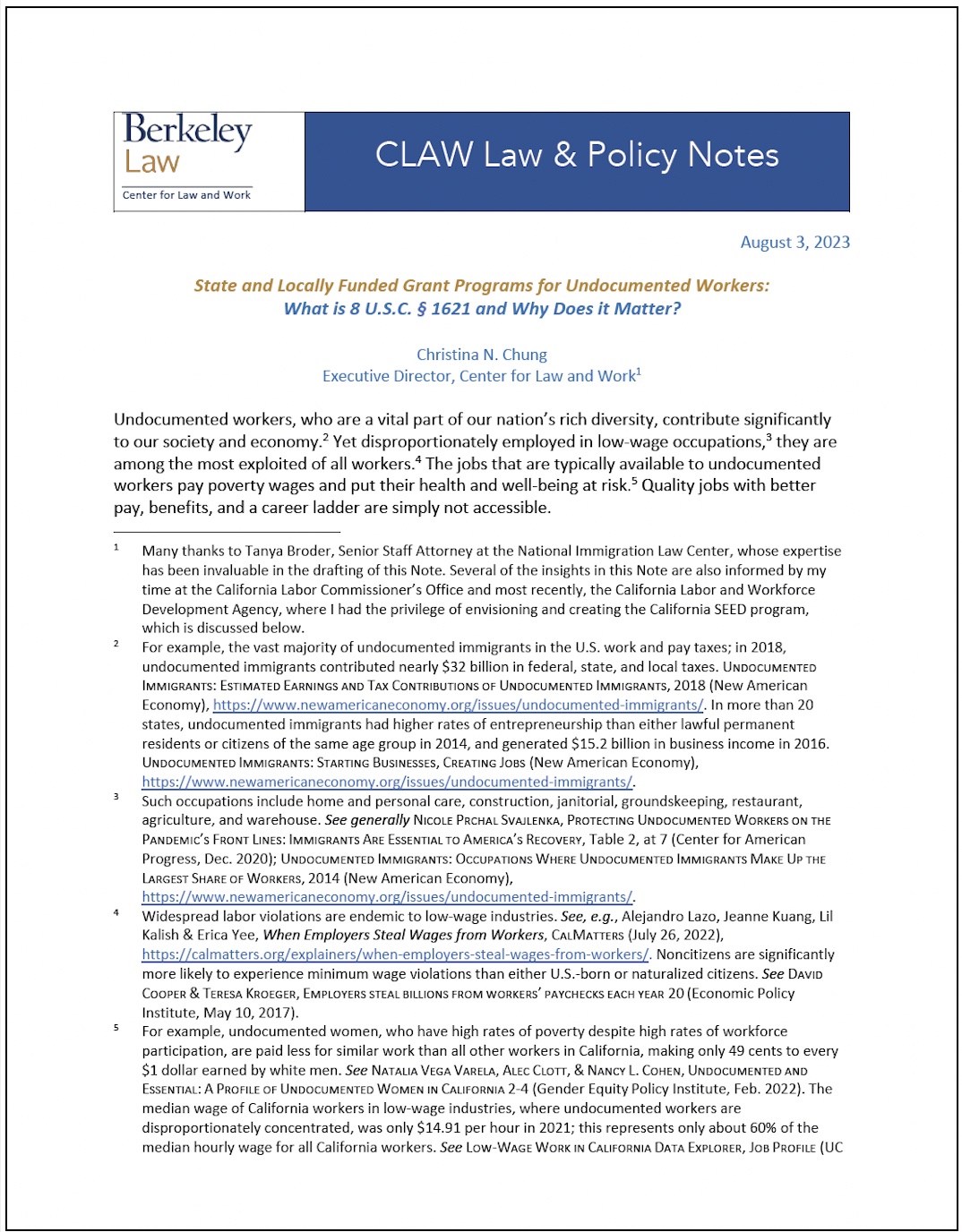 LAW & POLICY NOTE (August 2023)
LAW & POLICY NOTE (August 2023)In 2021, California created a groundbreaking grant program, Social Entrepreneurs for Economic Development (SEED), which awarded nonprofit community-based organizations almost $10 million in state funds to provide entrepreneurial training and microgrants to individuals facing substantial barriers to gainful employment due to their immigration status or limited English proficiency. SEED training and microgrants supported individuals in launching or maintaining a small business to address a social problem or meet a community need, as well as the development of worker-owned cooperatives in low-wage industries. California enshrined SEED into state law, in order to eliminate even the smallest risk that an anti-immigrant provision of federal welfare law, codified at 8 U.S.C. § 1621, could be used in an attempt to invalidate the program. A draconian statute not widely known in the labor and workforce development field, section 1621 was passed by Congress in 1996 to restrict the eligibility of undocumented individuals for “state or local public benefits”—and has been the basis of lawsuits attacking various state and locally funded initiatives serving undocumented individuals. This Note informs policymakers about section 1621, and how state and local grant programs like SEED for undocumented workers can be shielded against a section 1621 challenge. We look to California for best practices in addressing section 1621, and highlight two potent legal arguments that could be utilized against a lawsuit alleging a violation of the law.
Brief of Amici Curiae Center for Law and Work and Labor and Constitutional Law Scholars in Support of Defendants’ Petition for Rehearing or Rehearing En Banc (Olson v. State of California)
AMICUS BRIEF (May 2023)
The Center, along with 28 labor and constitutional law scholars, filed an amicus brief in support of the state of California's petition for rehearing or rehearing en banc in a case before the Ninth Circuit, Olson v. State of California. In Olson, a panel of the appellate court held that the district court erred when it dismissed Uber’s and Postmates’ claim that AB 5 (California's worker classification law that codifies the ABC test) violates the Equal Protection Clause. The Center’s amicus brief argues that the panel’s opinion, far from a paradigm of judicial restraint that is required under the rational basis standard, represents a form of judicial activism that radically diverges from well-established equal protection jurisprudence and conflicts with the Ninth Circuit’s previous interpretation of AB 5.
Despite the panel’s obligation to accord AB 5 a strong presumption of validity, the panel focused on the alleged “animus” of legislators as indicating that either: (1) AB 5 has no legitimate governmental purpose; or (2) there is no rational relationship between any legitimate governmental purpose and AB 5’s exemptions. The Center’s brief highlights why both conclusions are incorrect. First, the panel’s ruling that AB 5 has no legitimate purpose (because the “primary impetus” was “animus”) improperly renders alleged “animus” dispositive while it erroneously assumes Plaintiffs may claim constitutional protection as a “politically unpopular group.” Second, in refusing to observe the rational relationship between AB 5’s exemptions and the statute’s legitimate purpose, the panel casts aside decades of equal protection precedent, improperly second-guesses the legislature’s policy choices, and misapprehends how AB 5’s exemptions from the ABC test actually function.
Leslie v. Starbucks: Why Hire Labor Spies When Courts Will Do the Union-Busting for You?
 LAW & POLICY NOTE (November 2022)
LAW & POLICY NOTE (November 2022)In the union organizing campaigns of the 1930s, companies paid legions of spies to report everyone who attended a union meeting and what was said. Union meetings were held at night in pitch dark rooms so that no one could tell who else was there and who said what. Today, Starbucks needn’t hire spies. They just use subpoenas in civil litigation. In an outrageous decision, a judge in the Western District of New York let them get away with it.
The subpoena was issued in the NLRB’s litigation to obtain an injunction under section 10(j) of the National Labor Relations Act against Starbucks’ ongoing unfair labor practices against Starbucks workers in Buffalo and Rochester. Not content to follow the usual NLRA processes for gathering and presenting evidence in the administrative hearing, Starbucks tried to subpoena an enormous amount of confidential information about virtually every aspect of the entire nationwide Workers United campaign at every Starbucks across the country.
In September 2022, the judge ordered the union and the workers to produce a staggering number of emails, text messages, and records of other communications in response to the Starbucks subpoena. The order is contrary to law for several reasons that this Note explains. The matter is now on appeal in the Second Circuit, and if the court of appeals does not overturn the ruling, it will turn any enforcement action brought by the National Labor Relations Board into a hunting license for companies to harass unions and workers.
Viking River Cruises v. Moriana: California Courts are Not Bound by the U.S. Supreme Court’s Misconstruction of PAGA Standing
LAW & POLICY NOTE (July 2022)
The U.S. Supreme Court June 2022 decision in Viking River Cruises, Inc. v. Moriana held that the Federal Arbitration Act (FAA) does not preempt a rule of California law that invalidates contractual waivers of the right to assert representative claims under the California Private Attorneys General Act (PAGA) in any forum. However, in a portion of the majority opinion that four justices refused to join, the Court created confusion about whether plaintiffs subject to arbitration lose standing under state law to maintain representative PAGA claims in court.
We discuss PAGA in light of Viking River Cruises for the aid of courts and litigants and explain why the majority’s view of PAGA standing in Viking River Cruises clashes with the California Supreme Court’s authoritative approach to PAGA standing, announced two years ago in Kim v. Reins International California, Inc. We conclude that California courts are not bound by the portion of Viking River Cruises that posits the loss of representative standing to litigate PAGA claims on behalf of other employees, and instead must follow Kim.
The Fast Food Accountability and Standards Recovery Act (Assembly Bill 257): Strengthening the Bill to Protect the Floor on Labor Standards and Establish Franchisor Liability
LAW & POLICY NOTE (June 2022)
California's Assembly Bill (A.B.) 257, the Fast Food Accountability and Standards Recovery (FAST Recovery) Act, creates a partnership between fast food restaurant workers, their advocates, businesses, and state agency officials through a Fast Food Sector Council empowered to set labor standards specific to the industry. Recognizing that franchisors have little incentive to ensure that their franchisees have the resources necessary to continue their business operations while adhering to basic labor standards, the bill seeks to address the structural problems that cause endemic labor violations in the fast food sector. Regardless of whether the bill is signed into law, A.B. 257 will remain a consequential piece of legislation that serves as a template for improving labor standards in the fast food sector and in other low-wage industries. As such, it is critical to gain insights into how A.B. 257 can be strengthened – not only for present purposes, but also for any future legislation contemplating a labor standards council in the mold of A.B. 257.
Analyzing the latest version of the bill as of June 9, 2022, we propose model language that conforms the bill’s provisions with its intent to address pervasive labor abuses in the fast food industry. Our recommendations ensure that labor standards developed by the council cannot fall below existing state standards applicable to fast food workers; that the council’s higher standards are fully enforceable under the Labor Code, including under provisions authorizing damages or penalties for non-compliance with those standards; and clarify and strengthen the franchisor liability provisions of the bill so that fast food workers whose rights are violated are not left without meaningful remedies.
Failure to Deliver: Assessing Amazon’s Freedom of Association Policy under International Labor Standards
REPORT (May 2022)
On March 11, 2022, Amazon announced a new policy on freedom of association under international standards. Citing International Labor Organization and United Nations principles, Amazon pledged to comply with global norms on union organizing and collective bargaining, even when national labor law reflects a “gap in governance” with international standards. Published by the UC Berkeley Labor Center and CLAW, Failure to Deliver provides a legal analysis of Amazon’s policy and finds that on its face, the policy is non-compliant with global norms. The report also finds that Amazon management’s anti-union campaign tactics, both before and after issuing the policy in March 2022, continue to violate international standards.
